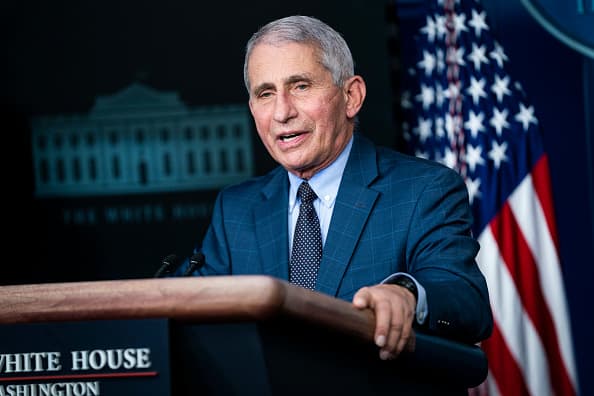
There’s a new kind of vaccine on the horizon — and it could help target all coronaviruses, not just Covid-19.
On Tuesday, White House chief medical advisor Dr. Anthony Fauci testified to Congress about the country’s efforts to develop a pan-coronavirus vaccine, meant to combat both Covid and other similar viruses that could emerge in the coming years. The short-term applications of a vaccine that effectively tackles all forms of Covid could be significant, Fauci said: “We won’t be chasing after the next variant.”
Longer term, Fauci said, the development of a universal coronavirus vaccine could help prevent the world’s next pandemic. Non-Covid coronaviruses have been responsible for diseases like SARS and MERS over the past two decades, alongside many common cold infections.
“The importance of developing a pan-coronavirus vaccine, namely one that would be effective against all SARS-CoV-2 variants, and ultimately against all coronaviruses, becomes even more apparent,” Fauci told the Senate Health, Education, Labor and Pensions committee.
There’s no set timeline for such a vaccine to become publicly available, but multiple research efforts are underway — with promising early results.
In April 2021, Duke University researchers announced that their pan-coronavirus vaccine was “100% effective in non-human tests including testing on primates.” The study noted “success in primates is very relevant to humans.”
Five months later, Duke and two other academic institutions — the University of Wisconsin and Boston-based Brigham and Women’s Hospital — received a total of roughly $36.3 million to fund the continued development of pan-coronavirus vaccines.
And in December, the U.S. Department of Defense’s Walter Reed Army Institute of Research announced its own development of a vaccine that, in pre-clinical trials, “not only elicits a potent immune response but may also provide broad protection against SARS-CoV-2 variants of concern as well as other coronaviruses.”
The Walter Reed vaccine, termed SpFN, completed its first phase of human trials last month, according to Defense One. It would still need to undergo phase 2 and phase 3 trials before advancing further.
“There’s a lot of investment, not only in improving the vaccines that we have for SARS-CoV-2, but a lot of work… to develop the next generation of vaccines, particularly universal coronavirus vaccines,” Fauci said at the hearing.
According to Fauci, the technology behind these vaccine efforts isn’t new. Rather, it relies on “clinical research investments” made decades before the Covid pandemic.
The same observation applies to the mRNA vaccine technology behind Pfizer and Moderna’s Covid vaccines: The first mRNA vaccines were tested on mice in the 1990s, and were simply too expensive and difficult to scale until recently.
“That same thing is going on right now [with universal coronavirus vaccines],” Fauci said.
Just don’t expect pan-coronavirus vaccines to be available during the current surge of Covid’s highly transmissible omicron variant. Even omicron-specific vaccines, which could be ready by March, will likely be “too late” to combat the highly contagious strain, experts told CNBC Make It on Monday.
“Given how quickly [omicron] is happening, [the targeted vaccine] may not matter because everybody’s going to be infected,” Dr. Shaun Truelove, an infectious disease epidemiologist at Johns Hopkins Bloomberg School of Public Health, told CNBC Make It.
At the hearing, Fauci maintained that the country’s current inoculation strategy — an initial vaccine regimen followed by a booster shot — is still successful at preventing Covid hospitalizations and deaths. Boosters, he said, are particularly important against omicron.
“Data … have indicated that vaccine-induced antibodies lose a considerable amount of potency in neutralizing the omicron variant,” Fauci said. “[But] a third shot boost of an mRNA vaccine significantly reconstitutes and enhances the ability of antibodies from boosted individuals to neutralize the omicron variant, strongly suggesting that boosters will play a major role in protecting our population.”
Sign up now: Get smarter about your money and career with our weekly newsletter
Don’t miss:




